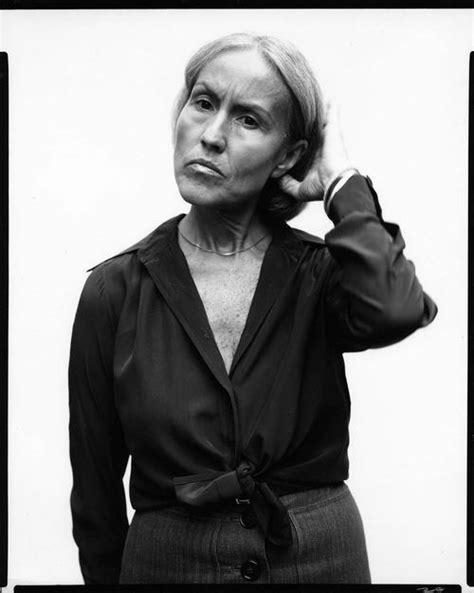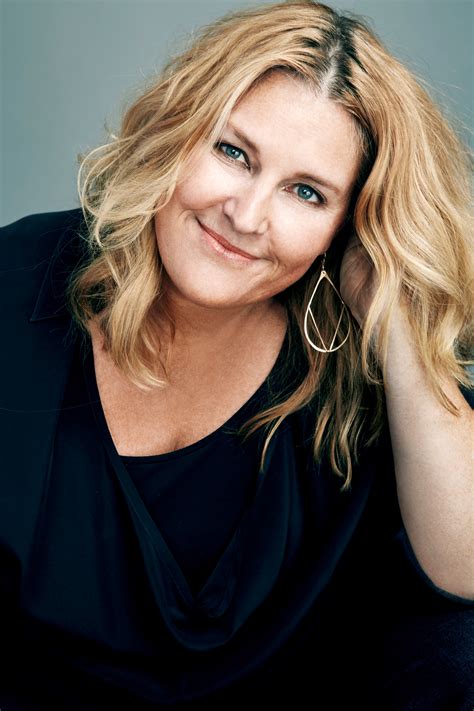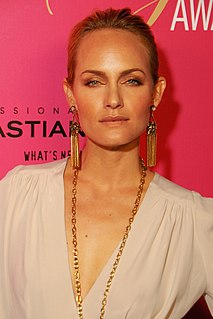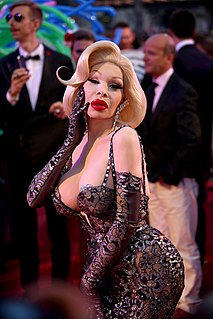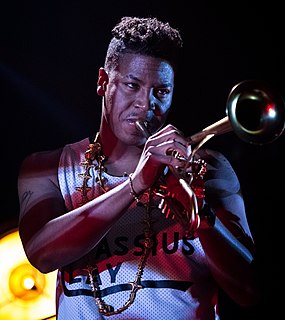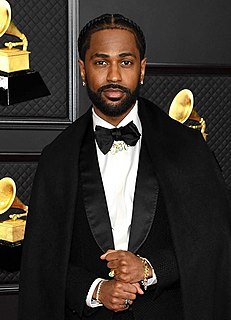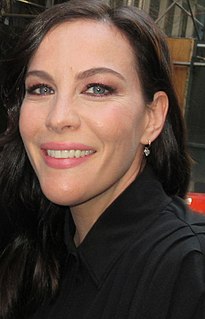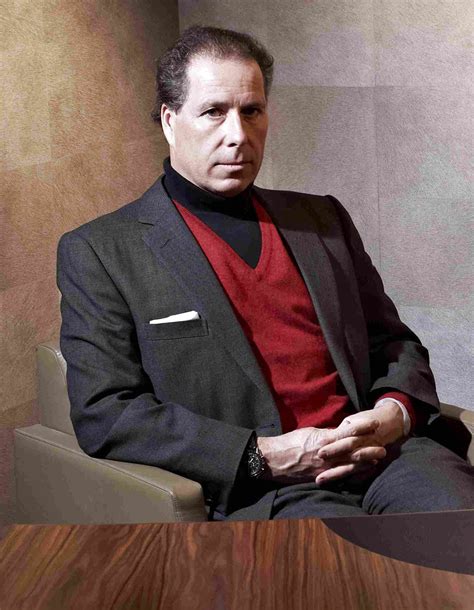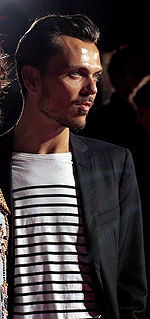Top 326 Vogue Quotes & Sayings - Page 6
Explore popular Vogue quotes.
Last updated on April 21, 2025.
The public psychology of going into debt for gain passes through several more or less distinct phases: (a) the lure of big prospective dividends or gains in income in the remote future; (b) the hope of selling at a profit, and realizing a capital gain in the immediate future; (c) the vogue of reckless promotions, taking advantage of the habituation of the public to great expectations; (d) the development of downright fraud, imposing on a public which had grown credulous and gullible.
Another thing you end up doing when you get older, is you spend so much time sort of trying desperately to keep from just looking just a little older. You're just constantly putting stuff on your face and having things removed from yourself and opening up copies of "Vogue" so that you can find new ways to throw whatever money you've managed to save into the arms of some doctor who has just come up with a new way of lasering your face that feels like electroshock and all these things.
After the war in Afghanistan, Anna [Wintour, editor of Vogue], deciding to save the world one hair-roller at a time, thought the best way to help the women in this beleaguered country was to start a small beauty school in Kabul, where aid workers could get their roots done. Vanity Fair, edited by Bush-basher Graydon Carter, cheered her great humanitarian effort.
When I graduated from school, World War II was still going on. At the time, my eldest sister, Nancy, was working in New York City at Lord & Taylor, and she had a great friend named Sally Kirkland who she worked with there and who later went to work as an editor at Vogue. I always told them, "I want to work in fashion like you do," and finally, in the late '40s, I got a job at Lord & Taylor, too.
I didn't want everybody to be pretty. I didn't want everybody to be thing. I didn't want everybody to be a size 4. I wanted it to be like the world. I think that we got there, and that was really special. I wanted texture and grit to everything. And then, you have an actress like Sarah Gadon, where you could rub dirt on her face and she'd look like she stepped off of a Vogue cover, and that's fine.
I knew I liked art. I knew I liked photography. I remember seeing photos of Linda Evangelista in Italian Vogue as a teenager, and at the time I didn't know who she was. There were two photos - one shot by Fabrizio Ferri and another one by Steven Meisel. I didn't know who any of those people were. I think it was the first summer I was modeling, I saw these magazines sitting out and looked at them. I remember thinking, These are the kind of images I want to make.
We mistakenly assume that bodily survival has a higher precedence than ego survival. This is simply not generally true. Ego will happily destroy the body for its own sake. Look at overweight executives headed for heart attacks on the way to getting their pictures in Fortune or anorexic models suffering slow starvation on their way to getting their pictures in Vogue. Protecting ego is the general case.
I never quite lived up to the image of the black man as I saw it growing up. I was never listening to the right music at the right time or wearing the right clothes at the right time. I was still listening to Michael Jackson, and everyone had sort of moved on to gangster rap. Alanis Morissette when everyone else was listening to En Vogue.
Looking good kept me out of trouble. When I worked for Michael Alig, everybody was overdoing partying. It would take me so long to get ready, because I was never one of those girls that were naturally the cover of Vogue. I had to really work hard to look nice. I would take hours and hours to get ready. If you have high heels on, if you're dressed nice, you really can't be drunk or sloppy because it's dangerous. It's part of being a lady, so it really kept me out of trouble.
People call what we do "stretch music." This is our style, and one of the newer, in vogue ways of playing creative, improvised music. It really grew out of me trying to address something that I saw in my everyday life in my neighborhood - trying to develop that and refine that and excavate exactly what that was in a way that, when I communicated it, it was palpable and easily read. That started really early. Why it started was from something that I was really angry about.
You can go up to the editor of 'Vogue,' and she might think I have horrible style, or maybe she thinks I have great style. Who knows? I don't really know too much about it: I just know what I like and what I don't like. I love clothes and making my own clothes and shoes, like I got to do with Adidas.
Being a teenage model was lot of fun, like playing dress-up. I'd feel ugly and awkward and chubby, and they'd transform me. Not that that makes everything better. Then my mom shopped the pictures around, I guess, and the agencies started calling. I wound up going with a little agency, Spectrum. It all happened really quickly, I started modeling for magazines like YM and Seventeen, and I did a couple of bigger things like Italian Vogue.
In the terms of our Great Society the Hell's Angels and their ilk are losers - dropouts, failures and malcontents. They are rejects looking for a way to get even with a world in which they are only a problem.The Hell's Angels are not visionaries, but diehards, and if they are the forerunners or the vanguard of anything it is not the "moral revolution" in vogue on college campuses, but a fast-growing legion of young unemployables whose untapped energy will inevitably find the same kind of destructive outlet that "outlaws" like the Hell's Angels have been finding for years.
Man stands in materialism; you and I are materialists. Our talking about God and Spirit is good; but it is simply the vogue in our society to talk thus: we have learnt it parrot-like and repeat it. So we have to take ourselves where we are as materialists, and must take the help of matter and go on slowly until we become real spiritualists, and feel ourselves spirits, understand the spirit, and find that this world which we call the infinite is but a gross external form of that world which is behind.
Do you dance, Mr. Darcy?" Darcy: "Not if I can help it!" Sir William: "What a charming amusement for young people this is, Mr. Darcy! There is nothing like dancing, after all. I consider it as one of the first refinements of polished societies." Mr. Darcy: "Certainly, sir; and it has the advantage also of being in vogue amongst the less polished societies of the world; every savage can dance.
The scriptures, for example, discredit an ancient philosophy that has come back into vogue in our day-the philosophy of Korihor that there are no absolute moral standards, that "every man prospers according to his genius, and that every man conquers according to his strength; and whatsoever a man does is no crime" and "that when a man is dead, that is the end thereof".
Vogue began to focus on the body as much as on the clothes, in part because there was little they could dictate with the anarchic styles...In a stunning move, an entire replacement culture was developed by naming a 'problem' where it had scarcely existed before, centering it on the women's natural state, and elevating it to the existential female dilemma...The number of diet-related articles rose 70 percent from 1968 to 1972...The lucrative 'transfer of guilt' was resurrected just in time.
My father's rooms, as a child, were a very exciting place to be. Not only because of the beautiful models who were coming to be photographed for Vogue or The Sunday Times but also because of the very avant-garde furniture that he had made. He made designs for the investiture of the Prince of Wales in 1969 at Caernarfon Castle.
For ten years, I wrote regular columns about science for women's magazines, and to my knowledge I'm the only person in the world who can say that. This has no kudos in either the science-writing world or the academic world, but it's one of the most challenging things I've ever done. It's much harder to write about cosmology for a magazine like Vogue than for the New York Times, which I've also written for, because you have to imagine that on the page opposite there'll be an advertisement for eyeliner, or an article about the latest trends in skirt length.
It is not difficult to be a revolutionary when revolution has already broken out and is in spate, when all people are joining the revolution just because they are carried away, because it is the vogue, and sometimes even from careerist motives. It is far more difficult--and far more precious--to be a revolutionary when the conditions for direct, open, really mass and really revolutionary struggle do not yet exist.
The American motion picture is the greatest unconscious carrier of propaganda in the world today. It is a great distributor for ideas and opinions. The motion picture can standardize the ideas and habits of a nation. Because pictures are made to meet market demands, they reflect, emphasize and even exaggerate broad popular tendencies, rather than stimulate new ideas and opinions. The motion picture avails itself only of ideas and facts which are in vogue. As the newspaper seeks to purvey news, it seeks to purvey entertainment.
I think the biggest shift is the way people look at and have access to fashion. It's already old the minute you've seen it, and we've already moved on. Fashion has become very in and out. Back in the days when I started, you would wait for Vogue to come out, and that is where you would see what people wore that month. Now we are looking at what someone is wearing this second.





